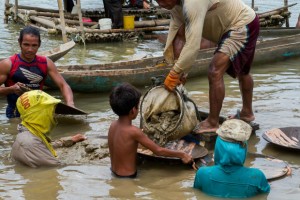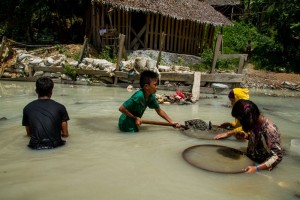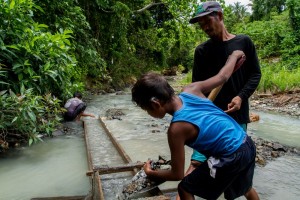Gov’t doing little for kids risking lives in PH gold mines—group
A human rights group on Wednesday said the Philippine government was failing to protect children who risked death from small-scale gold mining in the country.
In a report and video released on Wednesday, Human Rights Watch showed how child workers risk death in digging and diving for gold in dangerous small-scale mining in the Philippines.
The report titled “What…if Something Went Wrong: Hazardous Child Labor in Small-Scale Gold Mining in the Philippines” documented thousands of child laborers in small-scale gold mines in hazardous conditions in the Philippines, despite Philippine and international law prohibiting the practice.
‘Terrifying conditions’; little gov’t enforcement
“Filipino children are working in absolutely terrifying conditions in small-scale gold mines,” said Juliane Kippenberg, associate children’s rights director at Human Rights Watch.
“The Philippine government prohibits dangerous child labor, but has done very little to enforce the law,” Kippenberg said.
In 2014 and 2015, Human Rights Watch conducted field research in the provinces of Camarines Norte and Masbate and interviewed child miners.
The report said that beyond the fears of mine collapses and drowning, the child workers complained of numerous health problems, including back and body pain, skin infections, fevers, and spasms.
Child laborers also risk injury from falling rocks and wood beams, pit collapse, and lack of oxygen in underground mining.
Underwater mining

“Peter,” 11, works at an underwater mining site in Santa Milagrosa, Jose Panganiban. PHOTO by Mark Z. Saludes/Human Rights Watch
In the Philippines, underwater mining for gold, locally known as “compressor mining,” is prevalent in the said provinces.
In compressor mining, adult and child miners stay underwater for several hours in 10-meter-deep shafts where the miners receive air from a tube attached to an air compressor at the surface.
This practice puts adult and child miners at risk of drowning, decompression sickness, and bacterial skin infections.
Child miners described “moments of fear” when they dived for the first time.
“I was 13 the first time [I dived]. I felt scared because it’s dark and deep,” fourteen-year old “Dennis” said.
Sixteen year-old Joseph also expressed the same fear.
Losing air

Children pan for gold along the Bosigon River in Malaya, Camarines Norte. PHOTO by Mark Z. Saludes / Human Rights Watch
He said that if the diesel-powered compressor stops working, the miner can drown or get “the bends” coming up too quickly.
“Sometimes you have to make it up fast, especially if you have no air in your hose,” “Joseph” said.
“It’s a normal thing. It’s happened to me,” he added.
Kippenberg said that many children in Masbate and Camarines Norte are dropping out of school to work in gold mining.
“In order to tackle the root causes of child labor, the government needs to assist the poorest families financially and ensure their children are able to attend and stay in school,” she said.
Unaware of mercury dangers
The report pointed out that children usually work with mercury, which is a readily available toxic metal that is commonly used to process gold.
The report said children, unaware of the health risks of mercury, use their bare hands to mix mercury with gold ore and create an amalgam.
When they burn off the mercury to retrieve the raw gold, they breathe in toxic fumes, which attack the central nervous system and can cause brain damage and even death.
Human Rights Watch has observed in the mining village of Malaya, Camarines Norte, the unrestricted flow of light-grey, mercury-contaminated tailings from gold processing into the nearby river, where children play, swim, and pan for gold.
This has resulted in the children of Malaya complaining of tremors, symptoms that could be signs of mercury poisoning.
Minamata Convention
“The Philippine government should be introducing mercury-free gold processing, such as is practiced in Benguet province, to reduce the threat to all children,” Human Rights Watch said.
Human Rights Watch said the Philippines has signed but not ratified the Minamata Convention on Mercury of 2013, which sets out steps to reduce mercury exposure.
“The government should promptly ratify the Minamata Convention and test for mercury exposure among residents in mining areas,” HRW said.
HRW pointed out that in March 2015, the government banned the use of mercury in mining as well as compressor mining, but little has been done to implement this regulation so far.
Data show that the Philippines is the world’s 20th largest gold producer with an estimated 200,000 to 300,000 people working in the country’s small-scale gold mines.
Vital livelihood

A boy and his father shovel ore from the Bosigon River in Malaya, Camarines Norte. PHOTO by Mark Z. Saludes / Human Rights Watch
HRW said that in 2014, combined large scale and small-scale mines produced about 18 tons of gold.
The country’s central bank is the official buying agent for gold from small-scale mining and exports it.
The central bank, however, has no process in place to check the conditions in which the gold has been mined.
“Small-scale mining provides a vital livelihood for many Filipinos,” Kippenberg said.
“But the government needs to take urgent steps to ensure a safe and child-labor-free mining sector so that families can earn an income without putting their children at risk,” she added.